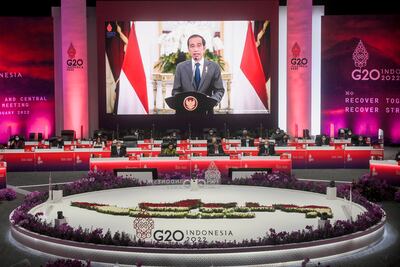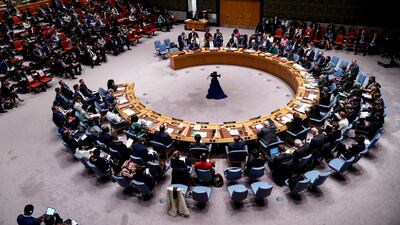If Shakespeare was alive, he would find a masterpiece in the theatre of the UN Security Council, instantly recognisable by its horse-shoe central stage. His plot can be imagined: world-renowned actors orating blood-curdling war tales and heart-rending pleas against a background of fakery and foxiness, while diplomatic skulduggery stalks the corridors.
The UNSC actors are not equal. The principal and permanent roles go to the US, UK, France, China and Russia who won the Second World War. They get to decide today’s storylines. The transient cast are states elected every two years by the UN General Assembly.
“All the world’s a stage," said Shakespeare whose genius combined comedy with tragedy. He could have been talking about the Security Council drama that premiered in London in January 1946. In thousands of subsequent performances, all the world’s mega crises have, to quote the Bard again, had “their exits and their entrances” there.
But Shakespearean audiences could show disapproval by pelting actors with rotten fruit. UN security precludes that, but similar sentiment is evident in near-universal frustration with the UNSC. This deserves exploration because only the Security Council can legitimately direct the conduct of 193 sovereign states and hence, the well-being of humanity.
Created in 1945, the UN is primarily intended to sustain peace and security. This was delegated by the UN Charter to the Security Council. However, that responsibility came with limited enforcement capabilities that have hobbled the Council's effectiveness ever since.
Any state can bring a dispute to the Security Council, which has two main tracks to deal with it. Chapter VI of the charter authorises the Council to seek peaceful dispute resolution through mutually agreed mediation, negotiation, arbitration, or judicial settlement. But its decisions are not binding. Besides, peace-loving states don’t need UNSC interference, while conflicting states are not in the mood for peace until they have given war a chance. This logic means that the UNSC is usually left huffing and puffing at the margins of the world’s quarrels and its preventive efforts achieve few results.
Once peace breaks down, especially when one state attacks another, the Council can consider legally binding coercive measures under Chapter VII of the charter. These include imposing sanctions or using military force. However, the UN has no economic clout or troops of its own and must rely on member states to enforce its will.
The first challenge comes in generating Council will, which is impossible if any permanent members exercise their veto. That has happened 266 times: 122 by the Soviet Union/Russia, 82 by the US, 29 by the UK, 17 by China, and 16 by France. In recent years, UNSC action has been blocked in relation to Ukraine, North Korea, Syria, Palestine, Venezuela, Yemen, Myanmar, Balkans, for example.
Vetoes are exercised when a permanent member’s own interests are involved, or that of its allies. But, using this power extracts great political costs. So, nowadays, the UNSC avoids formal consideration of contentious matters and prefers informal discussions. These have no authority and little outcome. Thus, the Council effectively passes the buck on our most serious problems. That is how situations in, say, Ethiopia and Sri Lanka never get voted upon.

The Council seeks a stronger moral voice via portentous statements such as 80 resolutions reaffirming its commitment to the Responsibility to Protect principles adopted at the 2005 World Summit. But they have had little impact against mass atrocity crimes, because the Council is usually unable to authorise practical interventions to save desperately vulnerable people. Meanwhile, the Council’s interventions, on the rare occasions that find internal agreement, have lost potency.
UNSC-approved sanctions include economic, finance and trade restrictions or arms embargoes, travel bans, and diplomatic isolation. There have been 30 sanctions regimes over 56 years, 14 of which are ongoing. They are easily flouted, and it is debatable if they elicit change. Poor targetting, even with humanitarian exemptions, have deepened poverty and despair for ordinary folk while doing little to rid their oppressors. Bypassing or profiting from sanctions has spawned all manner of corruption including within the UN. An egregious example was the Iraq Oil-for-Food scandal.
Equally contentious is Council-authorised peacekeeping. This relies on poorly trained and supported troops from developing countries who see this as a means to supplement their meagre defence budgets. For unstable states, it is also useful to keep their forces abroad in case they make trouble at home. Sexual abuse, exploitation, trafficking and other misconducts by peacekeepers add to the traumas of locals. There is widescale impunity as the UN is unable to enforce accountability, partly because it does not want to embarrass implicated member states on whom it relies so heavily.
The Council has authorised more than 70 peacekeeping missions, of which 10 are currently operational with 80,000 personnel and costing $6.5 billion annually. Impact is mixed, especially when they are deployed where there is no peace to keep. Or when the risk-averse rules of engagement of peacekeepers preclude them from helping civilians under attack. Or if they are too few and too late. As, for example, in Darfur where the genocide was done by the time they arrived. Or worse, in Rwanda when the Council withdrew the peacekeepers even as the genocide unfolded. Or shockingly in Srebrenica where UN peacekeepers withdrew from the scene effectively allowing massacres to occur. Elsewhere, peacekeeping simply buys time that allows fighters to rest before returning refreshed to the fray.
With its main peace and security business discredited by inadequate tools or paralysed by geopolitics, what has the Council been doing with its prodigious output of 2,651 resolutions? It turns to secondary matters, declaiming on HIV/Aids, Ebola, Covid-19, and development and social matters. Although there are other multilateral forums for such discussions, the Council must occupy itself somehow. The result is a securitisation of such issues through widening the definition of peace and security and bringing division to what should be unifying global concerns. Perhaps that is why the Council failed recently to adopt a resolution on climate change.
Declining UNSC influence is mirrored by the rise of G7, G20 and regional groupings such as the African and European Unions, as alternative decision centres, as the world fractures into many camps.

If the Security Council has lost its way, will change save it? There are two key elements in the long, vexed debate on reform. The first concerns the unrepresentative nature of the permanent membership of the Council in a 195-country, 7.7 billion world that has changed immeasurably since 51 nations with 2.3 billion people formed the UN. As no existing P5 member will vacate its seat, progress requires admitting new ones. With no agreed selection criteria, India has been most touted as a natural candidate, followed by Brazil. However, Germany, Italy, Japan, South Africa, Nigeria, Kenya, Egypt and others have also put themselves forward, if only to cancel out rival aspirations.
Alternative suggestions that regional bodies such as the African Union represent their constituencies on the Council are sceptically received. They have hardly shown great competence in pacifying their own disturbed hinterlands.
Even if the world could agree on expanding the Council’s permanent membership, would that make it more effective? That is unlikely if judged by the conduct of non-permanent members when they become Council members under prevailing rotational arrangements. Their voting record indicates that they are no better than the P5 in advancing an enlightened collective agenda.
Would it be better, therefore, to reform the veto power of permanent members – current and future? By abolishing or curtailing it? France suggested that the P5 voluntarily refrain from using the veto in mass atrocity situations, as judged by the Secretary General or Human Rights Council. But these organs are even less trusted than the UNSC, and the proposal was politely neutered. More interesting is an April 2022 General Assembly resolution, arising from UNSC paralysis over Ukraine, requiring the P5 to justify all veto usage. But shaming is unlikely to deter determined aggression.
The impasse on reform is symbolised by the 45 square-metre painting that towers over the Council chamber. Described by the BBC as the world’s worst public art, it is a hellish depiction of dragons and swords, soldiers and slaves, white saviours and black victims, completely inappropriate and insensitive for the current age. When the time came to refurbish the chamber, the US, Russia and China insisted it stay. Because, if you change the picture, what other changes may follow?
The Security Council is intended to provide enlightened governance to save us from the scourges of war, as promised in the UN Charter. Currently with a quarter of the world population affected by conflict, Council members are often at the forefront of unleashing violence, much less stopping it.
Is this set-up worth preserving? Perhaps it is better to look elsewhere for salvation.


